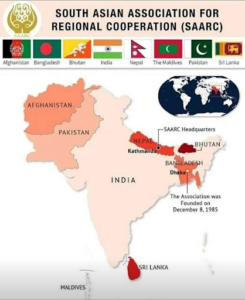In news– Recently, the South Asian Association for Regional Cooperation (SAARC) foreign ministers meeting was called off after Pakistan insisted on the inclusion of Afghanistan.
Key updates
- The meeting, which was to be held on the sidelines of the United Nations General Assembly (UNGA), was to be hosted by Nepal this year.
- Global nations, including India, have not recognised the Taliban government in Afghanistan.
- India and other members of the group objected to the proposal, after which the meet was cancelled.
- Even during the Shanghai Cooperation Organisation (SCO) meeting last week, PM Modi had said that the Taliban government in Afghanistan was ‘non-inclusive’ and stressed that the world should ‘think’ before accepting or granting recognition to the Taliban regime in Kabul.
- The grouping has been largely moribund since its 19th annual summit, which was to be held in Islamabad in 2016, was cancelled after an attack on an Indian Army camp at Uri that was blamed on Pakistan-based terrorists.
- The strained relations between India and Pakistan had also affected Saarc’s functioning, which operates on the principle of consensus.
- In 2019, Pakistan foreign minister Shah Mahmood Qureshi had boycotted the speech of his Indian counterpart at the Saarc meet to protest changes in the special status of Jammu and Kashmir.
About SAARC
- The SAARC is the regional intergovernmental organization and geopolitical union of states in South Asia.
- It was established with the signing of the SAARC Charter in Dhaka on 8 December 1985.
- Its member states are Afghanistan, Bangladesh, Bhutan, India, the Maldives, Nepal, Pakistan and Sri Lanka
- Afghanistan is the youngest member state of SAARC, having joined in 2007.

- The SAARC Secretariat was set up in Kathmandu on January 17, 1987.
- Decisions at all levels are to be taken on the basis of unanimity; and bilateral and contentious issues are excluded from the deliberations of the Association.
- Cooperation in the SAARC is based on respect for the principles of sovereign equality, territorial integrity, political independence, noninterference in internal affairs of the member states and mutual benefit.
Objectives
The objectives of the Association as outlined in the SAARC Charter are:
- To promote the welfare of the peoples of South Asia and to improve their quality of life.
- To accelerate economic growth, social progress and cultural development in the region and to provide all individuals the opportunity to live in dignity and to realize their full potential.
- To promote and strengthen collective self-reliance among the countries of South Asia.
- To contribute to mutual trust, understanding and appreciation of one another’s problems.
- To promote active collaboration and mutual assistance in the economic, social, cultural, technical and scientific fields.
- To strengthen cooperation with other developing countries.
- To strengthen cooperation among themselves in international forums on matters of common interests.
- To cooperate with international and regional organizations with similar aims and purposes.
Areas of cooperation
Agriculture, Education, Culture, Sports, Health, Population, Child Welfare, Environment, Meteorology, Rural Development (Including The Saarc Youth Volunteers Program), Tourism, Transport, Science and Technology, Communications, Women In Development, Prevention Of Drug Trafficking and Drug Abuse
















